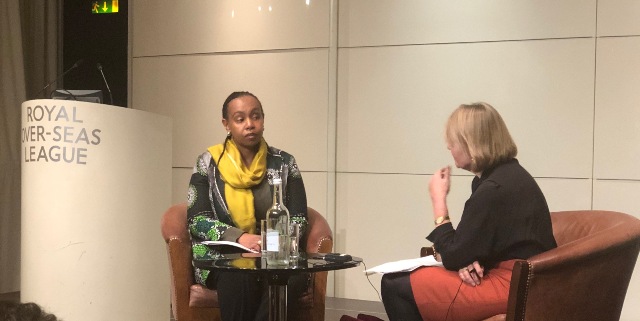 HE Ms Yamina Karitanyi, High Commissioner for Rwanda in conversation with Sue Onslow. [photo: Joanna Ewart-James]
HE Ms Yamina Karitanyi, High Commissioner for Rwanda in conversation with Sue Onslow. [photo: Joanna Ewart-James]
It was not really a lecture, and it was not really about the relevance of the Commonwealth in the 21st century. But a presentation this week by Yamina Karitanyi, Rwanda’s High Commissioner to the United Kingdom, gave a fascinating insight into how her government plans to use the Commonwealth summit in Kigali next June. Above all, it will be to showcase Rwanda. In contrast to previous outings by this consummate and able diplomat she placed less stress on this being “Africa’s summit” – the first in the continent since Uganda’s turn in 2007.
Speaking at the Royal Over-Seas League, in a lecture series that honours the League’s founder, she gave an opening talk, followed by an “In Conversation” with Dr Sue Onslow, Deputy Director of the Institute of Commonwealth Studies, and then spent time answering a variety of questions from the audience. She emphasised that Rwanda is the youngest member of the Commonwealth, and that 60% of its citizens are under 30. The summit should help educate them about this association. But she was cautious in suggesting that this one means more than others to which Rwanda belongs – like the African Union, which President Kagame recently chaired, or the Francophonie, where a Rwandan is now the chief administrator.
Most of her remarks dwelled on her country’s achievements since Kagame took power after the genocide: restorative justice using the indigenous gacaca system; a boost to literacy from 48% in 2000 to 89% today; a trebling of incomes and a drop from 95% to 16.5% in budgetary dependence on foreign aid; a striking advance in equality for women, in business and politics; and a grasping of all opportunities arising from the internet, from e-health to e-commerce. The philosophy of her government was to stay together, think big, and to look ahead.
Dr Onslow asked her whether she had come to see more significance in the Commonwealth, as a working diplomat. She said that, when she was stationed in Nairobi, Commonwealth High Commissioners met regularly to exchange views. Coming to London she was aware of a much wider and deeper series of Commonwealth organisations, commitments and engagements.
Most of the questions she received were friendly. But she was asked whether the members of the various forums at the Kigali meeting — Peoples, Youth, Business etc — would get together on one day, as happened in London last year. She said that discussions were ongoing. She thought that a parliamentary forum, recommended in London, might duplicate with the Commonwealth-wide conference of the Commonwealth Parliamentary Association, which took place in Uganda in September. She said Rwanda is grappling with climate change and promoting forestry.
On justice and rights she said that, after the genocide, survivors had the difficult challenge of being asked to forgive. The government could not jail everyone accused of murder and crime, and it had abolished capital punishment. The indigenous gacaca system for justice was faster than the slow-moving justice extolled by outsiders, and Rwandans had to deal with the problems themselves. She took a swipe at finger-pointing by outsiders, remarking that while hundreds had died in the Twin Towers on 9/11, Rwandans were coping with over a million who had been murdered in the genocide. Interestingly, she referred to these as Tutsi, though sadly some thousands of liberal Hutus were among the victims.



